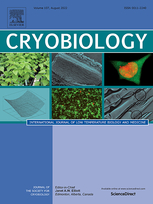
A ferromagnetic model for the action of electric and magnetic fields in cryopreservation.
Author(s) : KOBAYASHI A., KIRSCHVINK J. L.
Type of article: Article
Summary
Recent discussions in the literature have questioned the ability of electromagnetic exposure to inhibit ice crystal formation in supercooled water. Here we note that strong electric fields are able to disrupt the surface boundary layer of inert air on the surface of materials, promoting higher rates of heat transport. We also note that most biological tissues contain ferromagnetic materials, both biologically precipitated magnetite (Fe3O4) as well as environmental contaminants that get accidentally incorporated into living systems. Although present at trace levels, the number density of these particulates is high, and they have extraordinarily strong interactions with weak, low-frequency magnetic fields of the sort involved in claims of electromagnetic cryopreservation. Magnetically-induced mechanical oscillation of these particles provides a plausible mechanism for the disruption of ice-crystal nucleation in supercooled water.
Available documents
Format PDF
Pages: 163-165
Available
Free
Details
- Original title: A ferromagnetic model for the action of electric and magnetic fields in cryopreservation.
- Record ID : 30011364
- Languages: English
- Source: Cryobiology - vol. 68 - n. 2
- Publication date: 2014/04
- DOI: http://dx.doi.org/10.1016/j.cryobiol.2013.12.002
Links
See other articles in this issue (3)
See the source
Indexing
- Themes: Cryobiology, cryomedicine: general information
- Keywords: Training; Ice; Supercooling; Model; Cryopreservation; Freezing; Magnetic field; Electric field
-
Mini-review: ultra-slow relaxation in frozen-in...
- Author(s) : SUGA H.
- Date : 1997/01
- Languages : English
- Source: Cryo-Letters - vol. 18 - n. 1
View record
-
Blood chemistry and ice nucleating activity in ...
- Author(s) : STOREY K. B., MCDONALD D. G., DUMAN J. G., et al.
- Date : 1991/11
- Languages : English
- Source: Cryo-Letters - vol. 12 - n. 6
View record
-
Aspects of the cryobiology of the intertidal ha...
- Author(s) : MCALLEN R., BLOCK W.
- Date : 1997/12
- Languages : English
- Source: Cryobiology - vol. 35 - n. 4
View record
-
CRYOBIOLOGICAL IMPLICATIONS OF DIFFERENT METHOD...
- Author(s) : PITT R. E.
- Date : 1990
- Languages : English
- Source: Cryo-Letters - vol. 11 - n. 3
View record
-
REMARKS ON ICE FORMATION IN BINARY AQUEOUS SOLU...
- Author(s) : THOM F., MATTHES G.
- Date : 1986
- Languages : English
- Source: Cryo-Letters - vol. 7 - n. 5
View record
